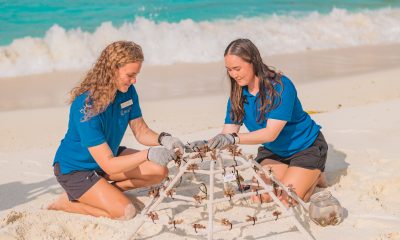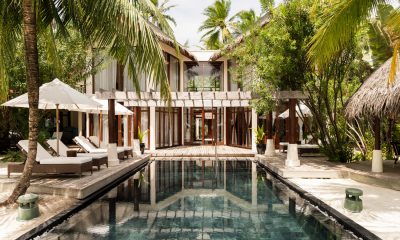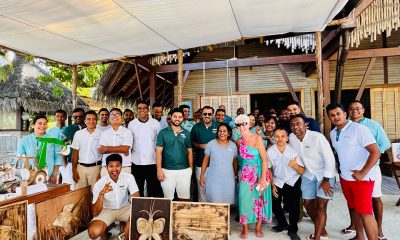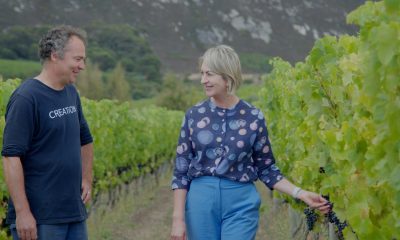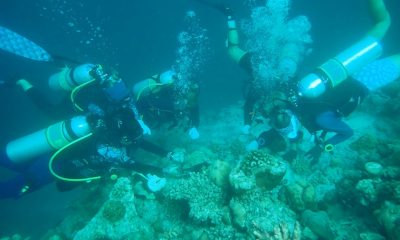Action
Coral conservation in Maldives with Constance Hotels

Ever wondered what’s going on underneath the sparkling Maldives ocean? From mammals to molluscs, the marine life that inhabits the Maldives water is diverse and is held together by oceans coral reefs.
These coral reefs provide an ecosystem for life underwater, protect coastal areas by reducing the power of waves hitting the coast, and provide a crucial source of income for millions of people.
Did you know that coral reefs are one of the most valuable ecosystems on the planet?
They are capable of producing half of the oxygen we breathe or creating the biggest structure made by living organisms that can be seen from space. Their complex tridimensional structure harbours the biggest amount of marine species per unit area when compared to other marine ecosystems.
It is like a small busy city where other animals and plants find shelter, food, or a partner to mate.
Coral reefs also support fishing and tourism industries, protect the shoreline and help fight climate change, among other key functions.
The most effective measure to safeguard these ecosystems and all the organisms that depend on them is the establishment of marine protected areas (MPAs).
Besides, the development of coral restoration projects worldwide, like the one in Constance Moofushi, contributes to this regard at a local scale.

The coral restoration project at Constance Moofushi started at the end of 2017 in partnership with Reefscapers, the leading coral restoration company in the Maldives.
The target is to help restore the natural coral reefs surrounding the island by growing corals on iron frames. The type of growing form used for the project is the branching type. This type grows faster and it is easier to collect than the massive one.
The small coral pieces are attached to the bars of the frames with cable ties and generally start growing after a few weeks. In approximately three-years’ time, and if no major events disturb the corals (for instance, a wave of coral bleaching), the whole structure will be covered by colonies, which then become the new source for more coral planting.

The frame becomes part of the natural reef but pieces of colonies can also be detached from it and placed back onto the degraded reef.
Guests visiting the resort are the main sponsors of the project. Purchasing the frames and attaching the corals before placing them in the water. All this of course under the supervision of our resident marine biologist in charge of the conservation project.
The small monetary benefits of the project are reinvested. For instance, planting more frames into the sea, inviting specialists in the field to the resort or organising a coral conservation day for local kids.
Moreover, the project has also a small social component because the frames are constructed in a local island called Fulhadhoo in Baa atoll by fishermen. Currently, there are 135 frames in the water divided into two main areas: the drop-off and the arrival jetty.
Have you seen any of these coral restoration projects during your travels?
How long does it take for corals to recover?
When corals are stressed, for instance, if the temperature of the ocean rises, they can turn white (bleaching). The reason for this change is the loss of the microscopic algae living inside of them (zooxanthellae) due to the stressful conditions.
Zooxanthellae are not only responsible for the amazing colours of the corals but provide most of the food corals need to survive and grow. The survival of coral reefs depends on their resistance to bleaching, tolerance to survive a beaching event and the level of recovery they display.
Every coral colony has a different set of genes and is surrounded by different environmental factors; hence, it becomes very difficult to predict the outcome from a bleaching event.

Nowadays, the biggest problem is the increased frequency of bleaching events due to climate change, combined with other stressing factors such as ocean acidification or water pollution. If the stressor is removed in a short period, corals are potentially capable of uptaking new algae and survive.
But if the stressor stays for a long time, it becomes hard for corals to go back to normal and survive.
Even if they survive a bleaching event, the overall health and capacity of the reef to reproduce is hindered.
Some experts point out that after following a major bleaching event, it takes around 5-10 years for corals to fully recover.
But as mentioned above, this is quite difficult to predict and it can never be assured it will come back to the previous state.
It may be a long road ahead, but let’s do all we can to help these corals bloom back into their prime condition.
Does coral need sunlight to grow?
Many corals, including all the reef-building corals (those capable of creating the living limestone structures called coral reefs), have microscopic unicellular algae (like “small plants”, called zooxanthellae) living within their tissues in a very successful relationship know as symbiosis. Both organisms benefit from it, with the algae finding shelter in the body of the coral and the coral getting food and oxygen from the algae.
We must remember that all plants (including the algae) photosynthesise, a process by which they absorb carbon dioxide and nutrients to build up sugars and release oxygen.

Since algae need sunlight to do the photosynthesis and survive, we could say that indeed corals need light too. The most interesting fact is that the algae cover almost 70 per cent of the coral needs. Hence, without this relationship between them, there would be no coral reefs in the world.
This also explains why corals thrive in poor waters low in nutrients. Corals get the rest 30 per cent of the food by sieving seawater with their tentacles. We don’t know about you but our mind is blown!
What’s the rarest coral?

In 2010, during an underwater survey in the remote North Pacific, specifically in the Arno atoll in the Marshall Islands, scientists discovered what could be the world’s rarest coral.
It looked very similar to the critically endangered Elkhorn coral (Acropora palmata) of the Atlantic Ocean, but genetic analyses made clear it was the Pacific Elkhorn coral (Acropora rotumana).
This species had not been spotted in over 100 years and it could be the same once described in Fiji islands in 1898, but no reliable data was gathered at that time.
If you spot this coral, make sure you get a snap of it!
What’s the role of Constance Moofushi’s marine biologists?
The marine biologist at Constance Moofushi, Estrella Gonzalez Tapias, manages the coral restoration project, gives four talks a week on marine life in the Maldives with a focus on conservation (manta rays, sea turtles, whale sharks and coral reefs), leads twice a week “Introduction to Moofushi reef”, and a presentation on marine life of the surrounding reefs.
She also takes guests on guided snorkelling trips to spot as much marine life as possible, joins as many whale shark trips as possible to enhance the guest experience and answer questions. She is also always around to meet guests and exchange knowledge with them.
So be sure to ask her any marine questions you have!

Estrella and Constance Moofushi’s team are also working on a number of projects. These include starting their own sea turtle database, to study the cetacean population near Moofushi, publishing their own guide to the reefs with photographs or broaden the resort’s collaboration with local NGOs such as Olive Ridley Project or Manta Trust! Talk about a dream job!
Have you ever been part of a coral restoration project? Are you feeling inspired to explore more of the ocean?
Action
Sun Siyam Olhuveli invests in staff wellbeing with upgraded sports facilities
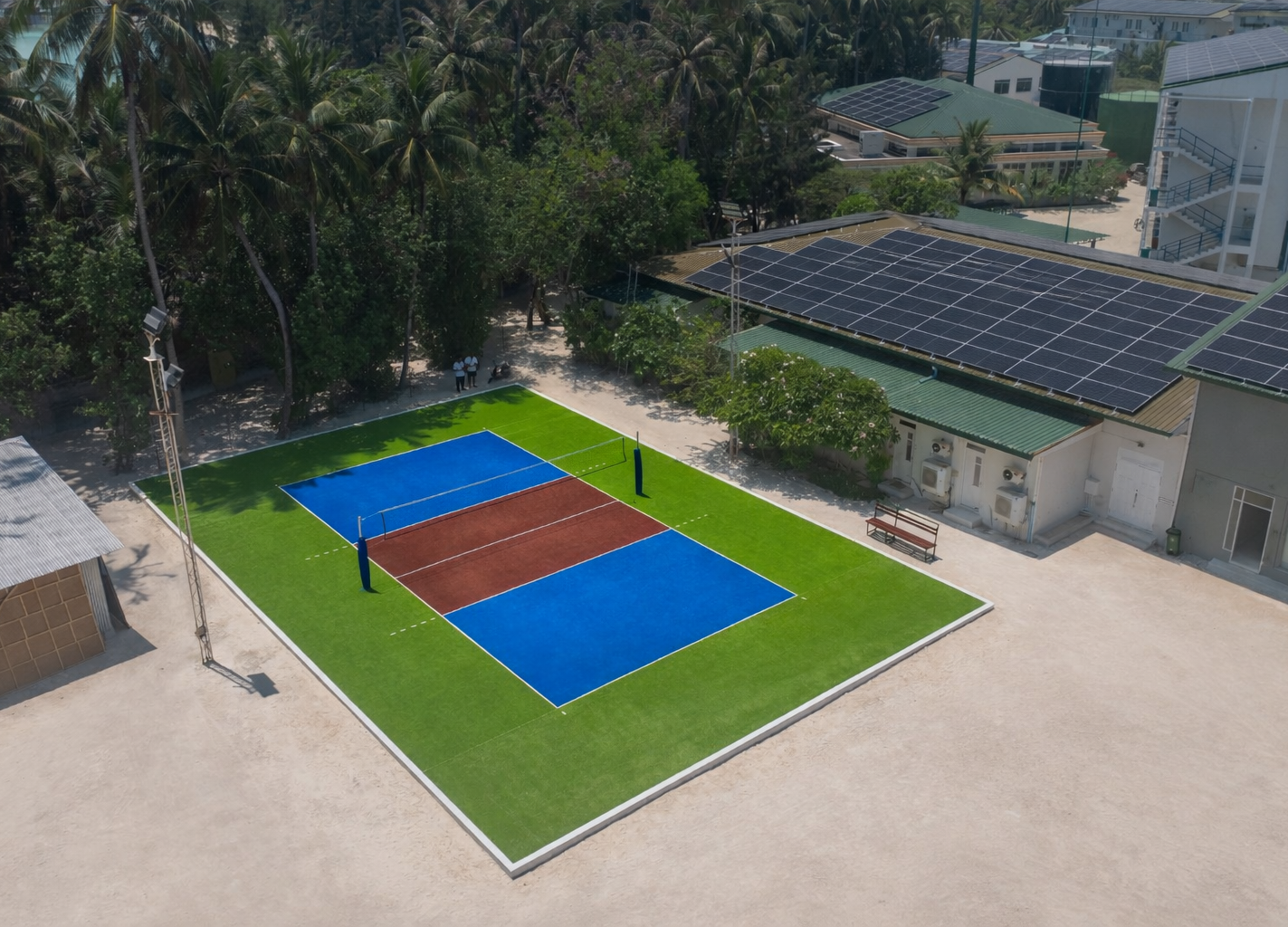
Sun Siyam Olhuveli has unveiled newly upgraded volleyball and futsal grounds for team members, reaffirming its commitment to employee wellbeing while advancing responsible, future-focused operations. The renovated volleyball grounds were officially inaugurated on 14 February, while the upgraded futsal ground opened earlier this year—together creating dedicated spaces for recreation, connection, and healthy competition across the island.
Designed to encourage regular physical activity and camaraderie beyond the workplace, the improved sports facilities represent a thoughtful investment in social infrastructure. They reflect a belief that wellbeing is fundamental to long-term performance, nurturing morale, teamwork, and a strong sense of belonging among team members.
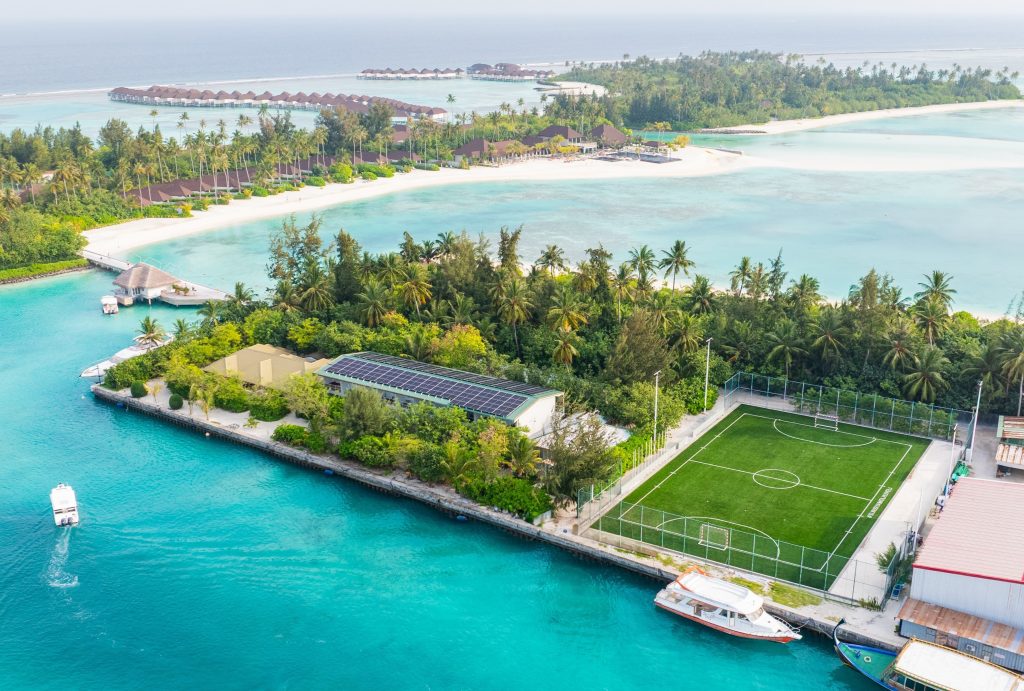
Alongside these developments, the resort has implemented NO BIN DAY every Tuesday, a practical initiative aimed at minimising food waste across operations. By encouraging mindful planning and responsible consumption, the initiative challenges teams to rethink habits around food—transforming sustainability into a shared, everyday discipline.
“Taking care of our people and the environment must go hand in hand. By investing in spaces that support our team’s wellbeing and introducing simple disciplines like NO BIN DAY, we are building a culture where responsibility is lived every day—naturally, collectively, and with purpose,” said Hassan Adil, General Manager of Sun Siyam Olhuveli.
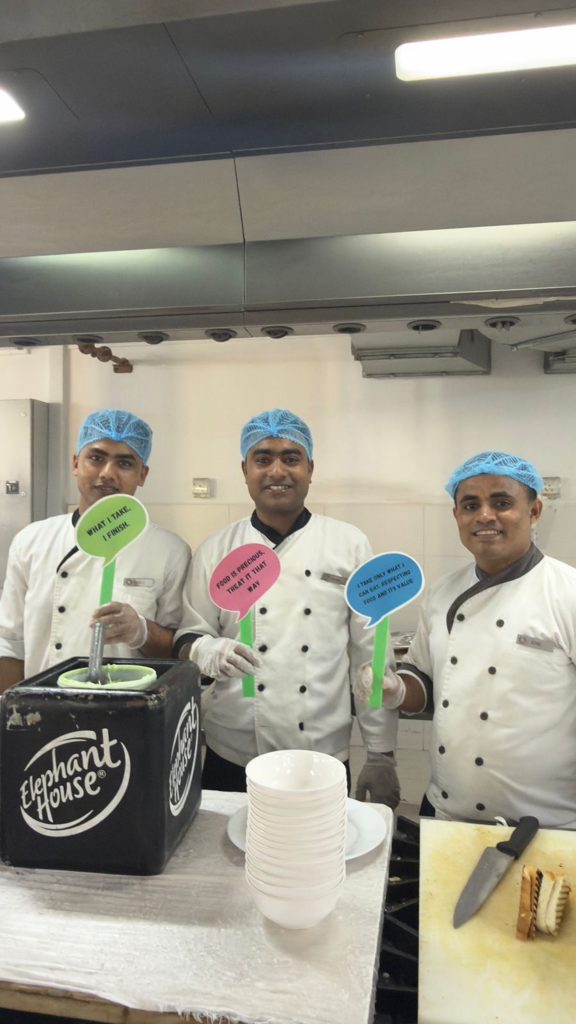
Both initiatives form part of Sun Siyam Care, the group’s corporate social responsibility platform, and align with the Social Infrastructure and Responsible Consumption and Production pillars under the GDS framework. Together, they reflect a people-first approach to sustainability—where everyday actions create lasting impact for teams, operations, and the wider community.
Sun Siyam Care is committed to creating a positive impact for people, communities, and the environment through responsible operations, social investment, and long-term sustainability actions across its destinations in the Maldives and Sri Lanka.
Guests are encouraged to learn more about these initiatives by visiting the Sun Siyam Care website at sunsiyam.com/sun-siyam-care.
Action
Sheraton Maldives Full Moon celebrates sixth anniversary of Reefscapers collaboration
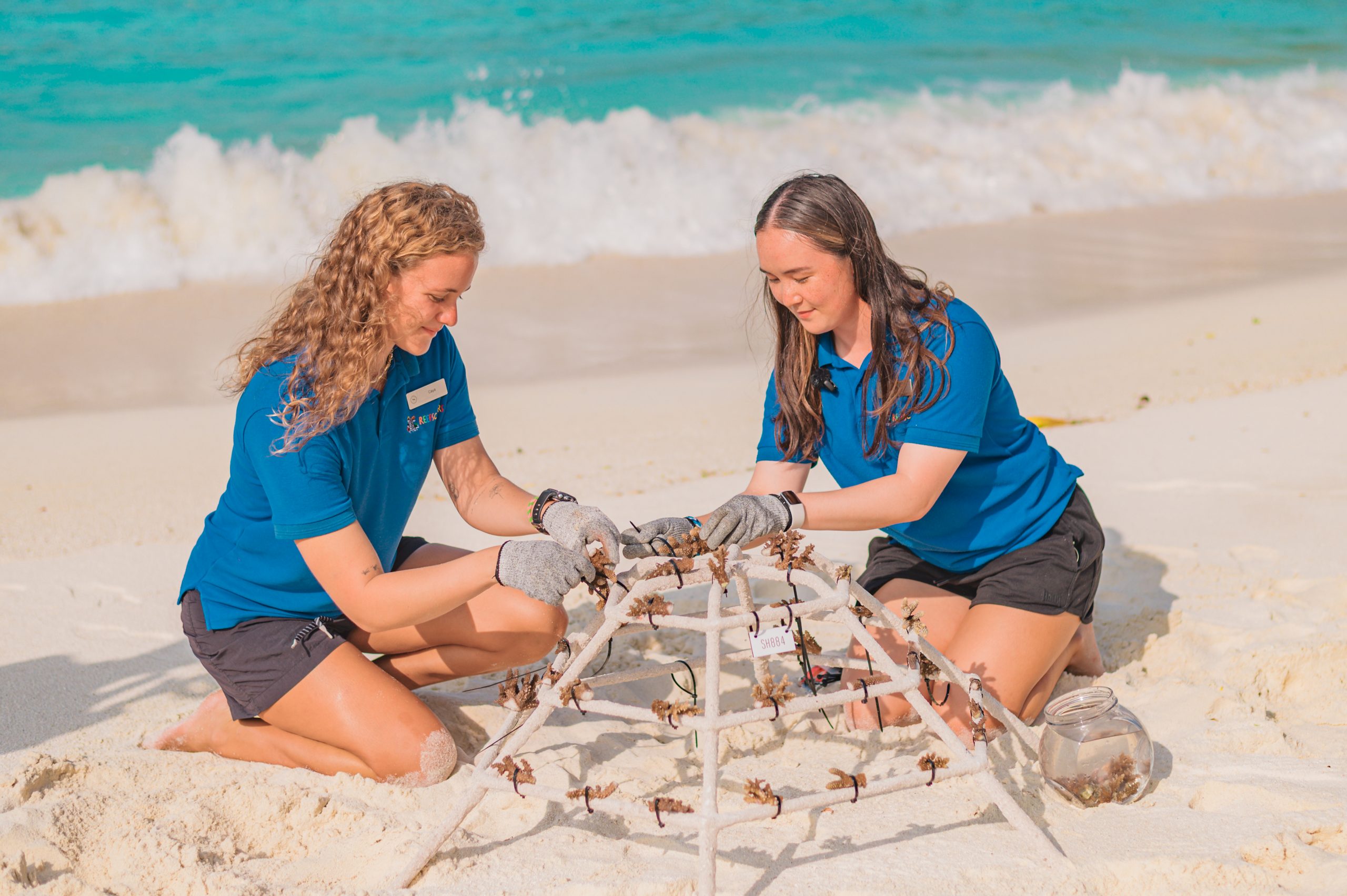
Sheraton Maldives Full Moon Resort & Spa marks the sixth anniversary of its partnership with Reefscapers on February 19, 2026, reaffirming its commitment to protecting and restoring the Maldives’ fragile reef ecosystems. Since launching the partnership in 2020, the resort and Reefscapers have worked together to restore coral habitats, support marine biodiversity, and engage guests in meaningful conservation experiences. The milestone also marks one year since the successful relocation of approximately five tons of coral to the resort’s house reefs — one of the partnership’s most significant conservation initiatives.
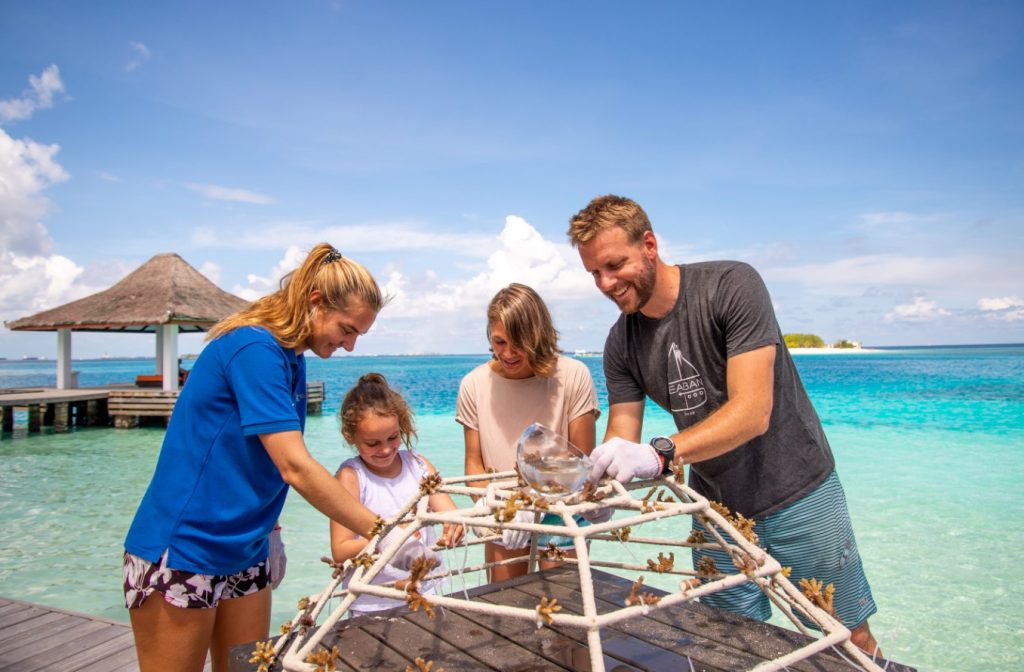
Over the past six years, the partnership has become a defining pillar of the resort’s sustainability journey, blending scientific restoration with purposeful guest engagement. To date, the initiative has resulted in the planting of 898 coral frames, supporting approximately 33,000 coral colonies now growing across the restoration sites. Through coral propagation, reef monitoring, and awareness programmes, these efforts continue to regenerate reef structures while deepening understanding of the essential role coral ecosystems play in sustaining marine life and protecting coastlines. Each thriving coral frame reflects a shared dedication to preserving the natural wonders that make the Maldives one of the world’s most extraordinary marine destinations.
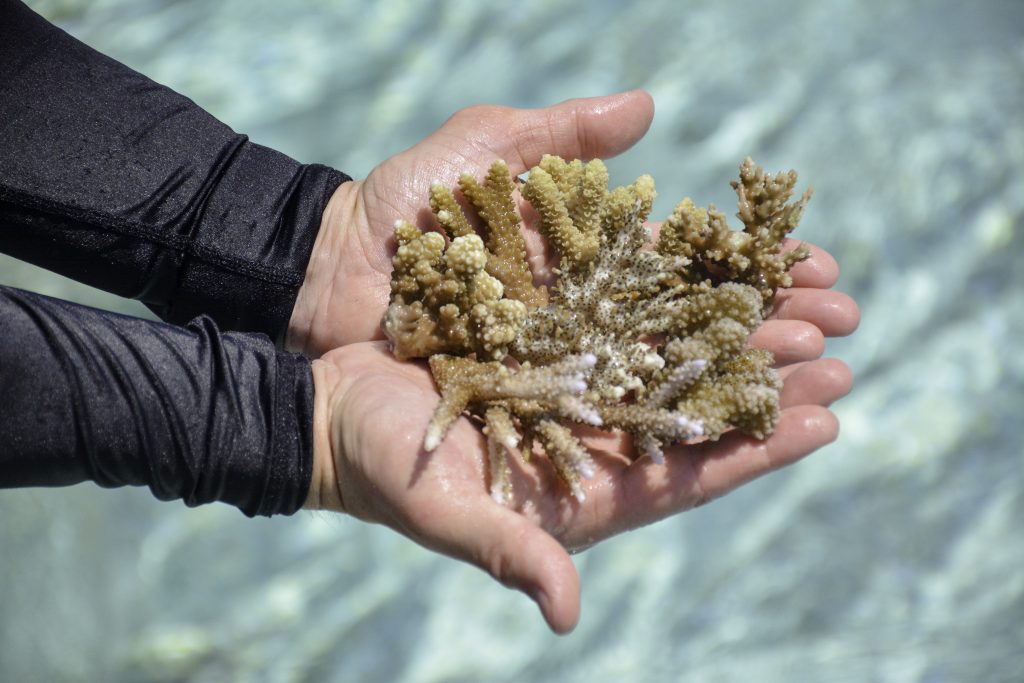
“What makes this partnership special is seeing how small, consistent actions turn into real change underwater. Watching the relocated corals settle, survive, and begin to grow over the past year has been incredibly rewarding for us and the guests who return and witness how they’ve helped restore a living reef,” shares Katelyn, the resort’s Marine Biologist.
A defining achievement of the collaboration has been the coral relocation project, which carefully transferred coral colonies from Ras Malé, also known as the Maldives Eco City, to the resort’s dedicated restoration site, safeguarding them from potential threats linked to land reclamation activities in the Fushi Dhiggaru Lagoon. One year on, these corals continue to flourish beneath the surface, strengthening reef resilience and contributing to the long-term health of the surrounding ecosystem.
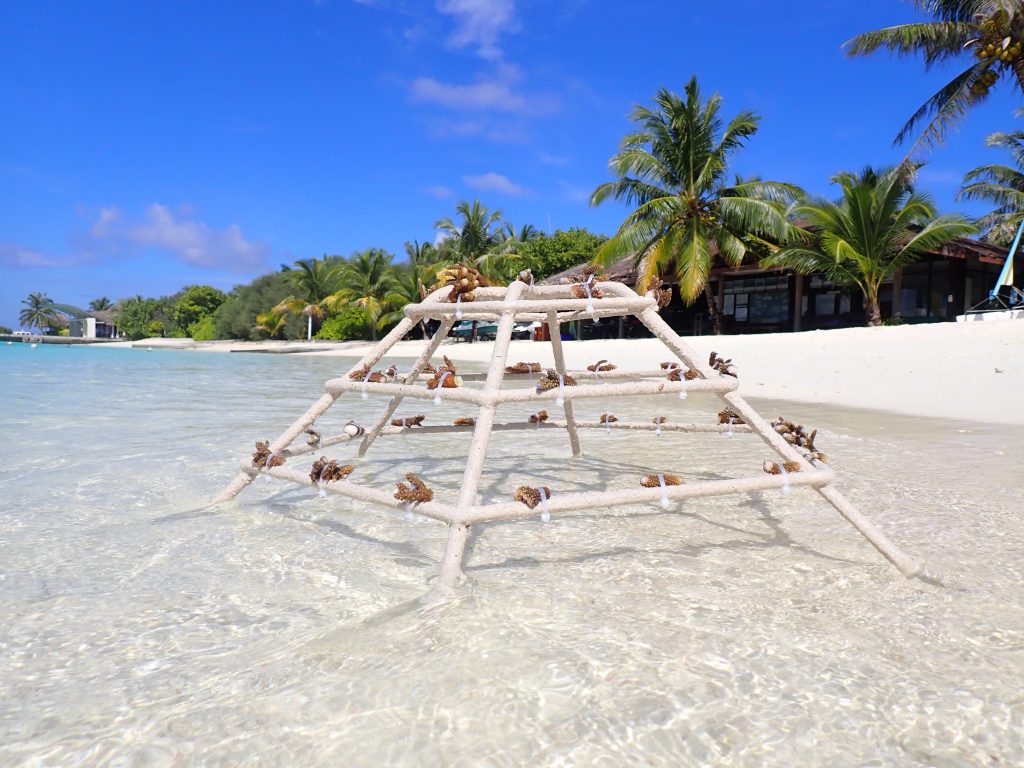
At the heart of the partnership lies the resort’s Adopt a Coral programme, part of the Good Travel with Marriott Bonvoy initiative, which encourages guests to travel with intention through meaningful environmental experiences. Through this hands-on activity, visitors can adopt and name a coral frame while learning directly from marine experts about coral ecology and the importance of protecting marine habitats.
To deepen this connection beyond the stay, guests receive growth updates on their adopted corals every six months, allowing them to follow the progress of their living contribution to the reef. As these corals grow over time, they become enduring symbols of renewal and shared responsibility, transforming a holiday memory into a lasting environmental legacy, and reflecting how travel can positively support local ecosystems and communities.
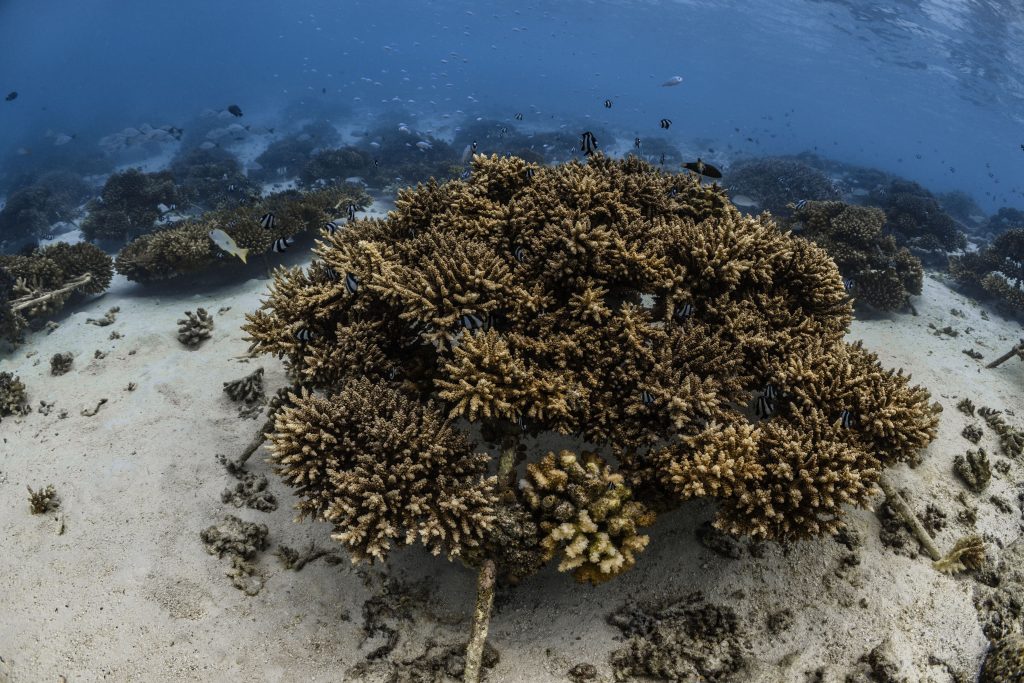
“Our island is surrounded by a remarkable marine environment, and protecting it is a responsibility we take seriously. Our partnership with Reefscapers reflects our belief that hospitality should go hand in hand with stewardship. Seeing the reef restoration progress over the past six years, and the involvement of our guests and associates in that journey, makes this anniversary especially meaningful for all of us,” comments Greg Allan, General Manager of Sheraton Maldives Full Moon Resort & Spa.
Through its continued collaboration with Reefscapers, Sheraton Maldives Full Moon Resort & Spa remains dedicated to advancing marine conservation while creating purposeful guest experiences rooted in sustainability, education, and connection to nature.
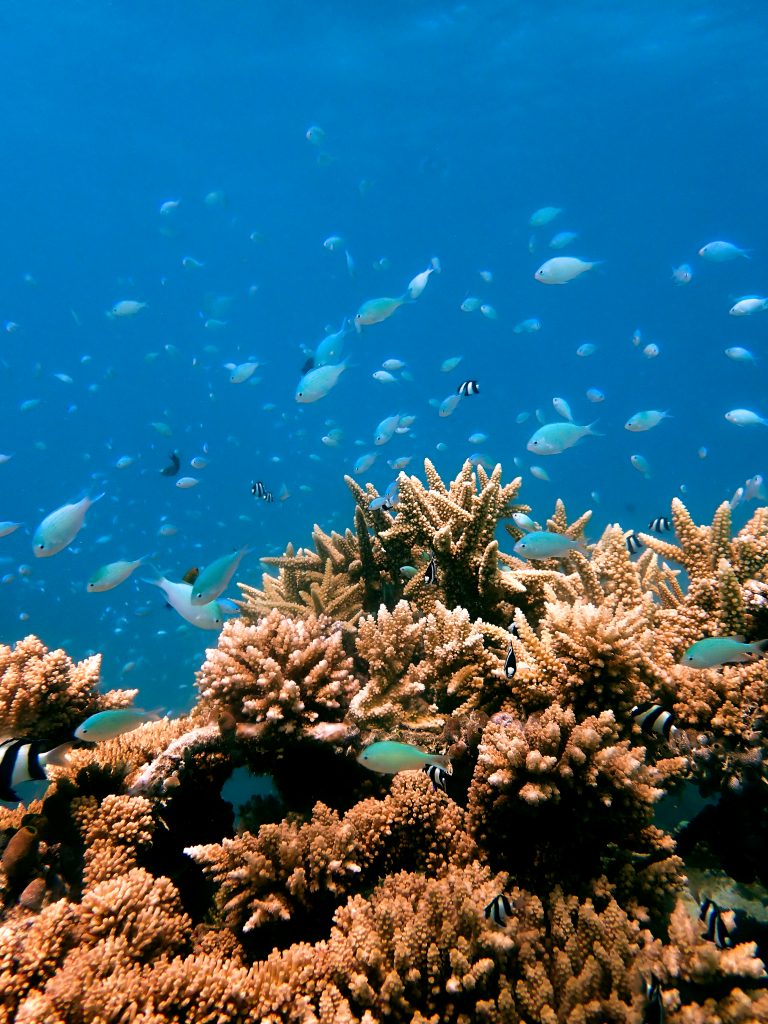
To discover more about the resort’s sustainability initiatives, join the Adopt a Coral programme, or plan a stay that supports reef conservation, visit sheratonmaldives.com or contact the reservations team at Sheraton.Maldives@sheraton.com.
Action
Sun Siyam Vilu Reef unveils expanded marine excursion portfolio

Sun Siyam Vilu Reef, part of the Sun Siyam Privé Collection, has introduced an expanded portfolio of water-based experiences designed to showcase the natural environment and marine life of the surrounding atolls. The enhanced programme combines exploration, activity and moments of calm, offering guests new ways to experience the Maldives through curated ocean journeys and personalised excursions.
Building on established activities such as Jet Car rides, SeaBob adventures and windsurfing, the resort has expanded its watersports offering to include private speedboat journeys and bespoke marine experiences. These additions are tailored for small groups seeking intimate and meaningful encounters with the ocean.
Available daily from the resort’s Watersports Centre, the new private speedboat excursions provide a personalised way to explore the hidden marine sites of Dhaalu Atoll. Designed for one to four guests, each journey offers flexibility and individual attention. Guests may choose from four-hour, five-hour or full-day itineraries, all of which include a freshly prepared barbecue lunch. From coral gardens to secluded sandbanks, the excursions highlight the region’s diverse marine landscapes.
The programme’s centrepiece is the Full Day Adventure Trip, which offers an extended exploration of key marine locations. Highlights include the Coral Garden, known for its biodiversity and reef formations; Turtle Point, where sea turtles are frequently sighted; and Nurse Shark Point, which provides opportunities to observe nurse sharks in their natural environment. The experience concludes with a beachside lunch on a private sandbank, set against uninterrupted views of the Indian Ocean.
For guests seeking a balance between activity and relaxation, the Waves of Adventure and Calmness experience combines a private two-hour snorkelling safari or Jet Ski safari with a full-body massage at the resort. The programme is designed to transition smoothly from ocean exploration to restorative island time, reflecting the relaxed pace that characterises Sun Siyam Vilu Reef.
As part of the Sun Siyam Privé Collection, Sun Siyam Vilu Reef continues to focus on personalised service and experiences rooted in the natural setting of the Maldives. Through its expanded watersports offering, the resort invites guests to engage with the marine environment while enjoying a sense of privacy, discovery and connection to the Maldivian seascape.
-

 Entertainment1 week ago
Entertainment1 week ago‘One festival, every sense’: Fari Islands Festival announces August 2026 return
-
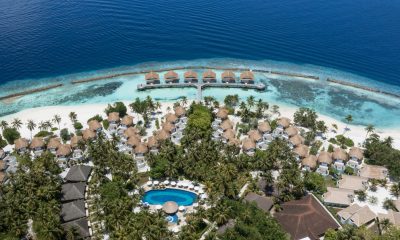
 Awards1 week ago
Awards1 week agoBandos Maldives earns Booking.com Traveller Review Award 2026
-
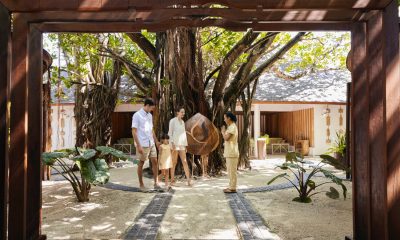
 Featured1 week ago
Featured1 week agoAncient banyan tree anchors spiritual experiences at Machchafushi Island Resort
-
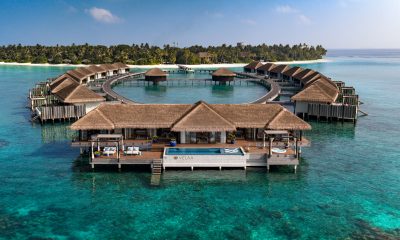
 News1 week ago
News1 week agoRefined overwater vision: Velaa Private Island’s upgraded Ocean Pool House
-

 Cooking7 days ago
Cooking7 days agoA spring of flavours: Nowruz dining series at JW Marriott Maldives Resort & Spa
-
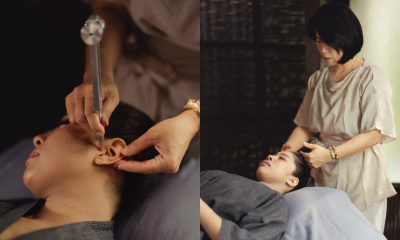
 Featured1 week ago
Featured1 week agoYoko Kawaguchi to lead holistic wellness residency at Vakkaru Maldives
-
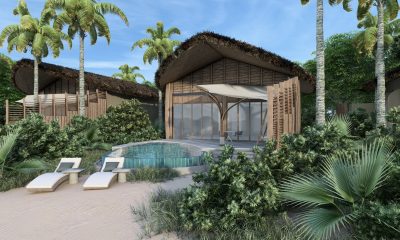
 News5 days ago
News5 days agoPulse Hotels & Resorts unveils Aura Maldives, a mindful luxury sanctuary
-
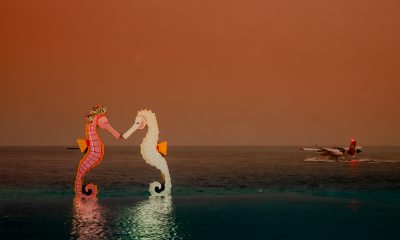
 Love1 week ago
Love1 week agoFushifaru Maldives combines romance and lunar new year traditions in guest programme



